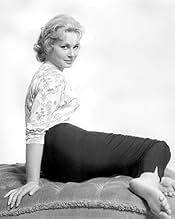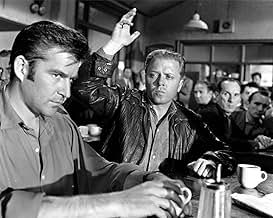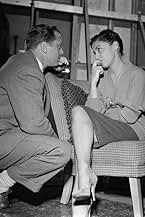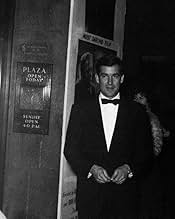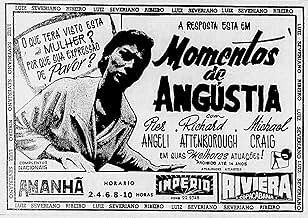ÉVALUATION IMDb
7,2/10
1,8 k
MA NOTE
Ajouter une intrigue dans votre langueA young factory worker decides to stand up against his workmates and fellow union members when they want to hold a wildcat strike.A young factory worker decides to stand up against his workmates and fellow union members when they want to hold a wildcat strike.A young factory worker decides to stand up against his workmates and fellow union members when they want to hold a wildcat strike.
- Director
- Writers
- Stars
- Nommé pour 1 oscar
- 6 victoires et 6 nominations au total
Avis en vedette
This brilliant, deeply contentious film has largely been ignored over the years. It came out just as 'the kitchen sink' was kicking in and, although dealing with the working class, was very much an establishment film. It's right-wing and anti-Union and it quickly became very unfashionable to think highly of it. But dramatically, it's first-rate; it has the feel of those good BBC 'Plays for today' that came out in the sixties even if does leave a very bad taste in the mouth.
It's about a man sent to coventry for not supporting an unofficial strike. He's played by Richard Attenborough and it's a great piece of acting. As written, the character isn't developed in dramatic terms but Attenborough is wonderfully naturalistic. It's an intuitive performance; he gets inside the character's skin and thought processes. He's very moving.
There is very fine work, too, from Pier Angeli as his Italian wife. (Angeli was probably brought in to sell the film in America, and there's an easy-going, unforced quality to her acting that is very 'un-British'). And Bernard Lee is excellent as the dictatorial shop steward. The film also has an unfortunate Mephistopolean character in the form of an infiltrator. He's evil and cowardly and used in such a blatantly metaphorical way you can't be sure exactly what his purpose is. And being a political, Union bashing film you may feel uneasy watching it. But there are very fine. sustained dramatic sequences, too and it is utterly unsentimental.
It's about a man sent to coventry for not supporting an unofficial strike. He's played by Richard Attenborough and it's a great piece of acting. As written, the character isn't developed in dramatic terms but Attenborough is wonderfully naturalistic. It's an intuitive performance; he gets inside the character's skin and thought processes. He's very moving.
There is very fine work, too, from Pier Angeli as his Italian wife. (Angeli was probably brought in to sell the film in America, and there's an easy-going, unforced quality to her acting that is very 'un-British'). And Bernard Lee is excellent as the dictatorial shop steward. The film also has an unfortunate Mephistopolean character in the form of an infiltrator. He's evil and cowardly and used in such a blatantly metaphorical way you can't be sure exactly what his purpose is. And being a political, Union bashing film you may feel uneasy watching it. But there are very fine. sustained dramatic sequences, too and it is utterly unsentimental.
"The Angry Silence" can be read in two ways: one, it is a pretty accurate depiction of the way union relations were run in the late 1950s and the shadow of the far left; or, it is a propaganda piece for the far right and nothing like the truth. There are strong arguments for both camps to be correct.
What struck me about the film was the central performance from Richard Attenborough as the lone worker standing up against bullying and blackmail from his trade union colleagues. One scene in particular which takes place in the canteen is a masterclass in screen acting of its type, and there are also good scenes between Attenborough and his screen wife, played by Pier Angeli, and his work colleague and lodger, played by Michael Craig.
Bryan Forbes always seemed to be veering off in different directions with the various movies on his CV, and this is an odd one. Whatever your politics, it is a good film and provokes a reaction. Whether the reaction is one which matches the reality has to remain open to question.
What struck me about the film was the central performance from Richard Attenborough as the lone worker standing up against bullying and blackmail from his trade union colleagues. One scene in particular which takes place in the canteen is a masterclass in screen acting of its type, and there are also good scenes between Attenborough and his screen wife, played by Pier Angeli, and his work colleague and lodger, played by Michael Craig.
Bryan Forbes always seemed to be veering off in different directions with the various movies on his CV, and this is an odd one. Whatever your politics, it is a good film and provokes a reaction. Whether the reaction is one which matches the reality has to remain open to question.
This film doesn't seem to be very well known but it has a lot to offer.
I've seen 50s/60s comedies based around factories but I can't remember many serious dramas like this. The plot holds few surprises but that leaves plenty of room for us to judge the acting, and I'd say it's consistently good. Richard Attenborough and Pier Angeli are a great combination as the young married couple - it's a shame Pier made so few films in English.
A lot of scriptwriters could do worse than watch this film and learn its lessons about how to tell a story in 90 minutes. And this is a good film for classroom use - leads nicely into a discussion of peer pressure and bullying.
I've seen 50s/60s comedies based around factories but I can't remember many serious dramas like this. The plot holds few surprises but that leaves plenty of room for us to judge the acting, and I'd say it's consistently good. Richard Attenborough and Pier Angeli are a great combination as the young married couple - it's a shame Pier made so few films in English.
A lot of scriptwriters could do worse than watch this film and learn its lessons about how to tell a story in 90 minutes. And this is a good film for classroom use - leads nicely into a discussion of peer pressure and bullying.
to anyone who lived through these times and these types of factory settings this film resonates.
The Burke character of the communist agitator invokes criticism of left bashing but anyone who had experience of the British motor/engineering industry in these times knows that it is much closer to the truth than many people want to believe.
However to those that think the film has right wing bias you only have to look at how the useless fat cat directors are portrayed (having no knowledge of the business they are taking large salaries from), hardly an advertisement of capitalism. Plus even the "sympathetic" management end up not supporting the worker who supported them, as bad as the agitator in their own way.
Good performances all round, outstanding from Richard Attenborough, Pier Angeli, an unusually good turn by Michael Craig and dependable Bernard Lee as the dim union man manipulated easily by the agitator.
A style of film-making gone now but interesting social commentary of the times. Recommended for social historians and affectionados of good acting.
The Burke character of the communist agitator invokes criticism of left bashing but anyone who had experience of the British motor/engineering industry in these times knows that it is much closer to the truth than many people want to believe.
However to those that think the film has right wing bias you only have to look at how the useless fat cat directors are portrayed (having no knowledge of the business they are taking large salaries from), hardly an advertisement of capitalism. Plus even the "sympathetic" management end up not supporting the worker who supported them, as bad as the agitator in their own way.
Good performances all round, outstanding from Richard Attenborough, Pier Angeli, an unusually good turn by Michael Craig and dependable Bernard Lee as the dim union man manipulated easily by the agitator.
A style of film-making gone now but interesting social commentary of the times. Recommended for social historians and affectionados of good acting.
Guy Green's (1960) film of Bryan Forbes' screenplay is based on a treatment by Michael Craig and, brother, Richard Gregson. Set in London in the late 1950's it was the first release of the joint venture production company Beaver Films set up by Bryan Forbes and Richard Attenborough.
As the film opens, we join Tom Curtis (Richard Attenborough) at work in a small engineering factory beset with labour problems. Single-minded and fiercely independent, Curtis is slow to grasp the implications of the fomenting unrest among his workmates as they band together to challenge the management head-on in a dispute that ultimately leaves Curtis out in the cold.
We follow Curtis home at night where his workmate Joe Wallis (Michael Craig - also writer) lodges with Curtis, his wife Anna (Pier Angeli) and their young family.
But as industrial relations deteriorate at work we see Curtis becoming increasingly isolated and intimidated by his determined colleagues.
With solid performances from Bernard Lee (Bert Connolly), Geoffrey Keen (Davis) and Alfred Burke (Travers) as the sinister agitator, the audience sees Curtis left high and dry as even the management feel compelled to abandon him.
Increasingly out of his depth, we are drawn into Curtis' worsening situation as his family are also intimidated in an effort to break his indomitable will.
This film captures something of the early struggle for recognition by employees in small firms like this before employment protection became enshrined in the law of the land. It gives us a feel for the situation of the casualties along the way and the forces at play.
As the film opens, we join Tom Curtis (Richard Attenborough) at work in a small engineering factory beset with labour problems. Single-minded and fiercely independent, Curtis is slow to grasp the implications of the fomenting unrest among his workmates as they band together to challenge the management head-on in a dispute that ultimately leaves Curtis out in the cold.
We follow Curtis home at night where his workmate Joe Wallis (Michael Craig - also writer) lodges with Curtis, his wife Anna (Pier Angeli) and their young family.
But as industrial relations deteriorate at work we see Curtis becoming increasingly isolated and intimidated by his determined colleagues.
With solid performances from Bernard Lee (Bert Connolly), Geoffrey Keen (Davis) and Alfred Burke (Travers) as the sinister agitator, the audience sees Curtis left high and dry as even the management feel compelled to abandon him.
Increasingly out of his depth, we are drawn into Curtis' worsening situation as his family are also intimidated in an effort to break his indomitable will.
This film captures something of the early struggle for recognition by employees in small firms like this before employment protection became enshrined in the law of the land. It gives us a feel for the situation of the casualties along the way and the forces at play.
Le saviez-vous
- AnecdotesThis movie was initially banned in certain parts of Wales, as several cinemas were controlled by the miners' unions at that time. It was only when Richard Attenborough personally intervened and screened it for the union leaders that the ban was revoked.
- GaffesThe girl lying on the grass with the motorcyclist is flat on her back on the grass then the shot changes and she has her head raised with her head using a tree trunk as a pillow.
- Citations
Tom Curtis: Shut up! Shut up will you! You don't have to worry about not talking to me. I don't want you to talk to me, do you hear? But you stay away from my family. Just stay away from us!
- ConnexionsFeatured in Film Review: Richard Attenborough (1968)
Meilleurs choix
Connectez-vous pour évaluer et surveiller les recommandations personnalisées
- How long is The Angry Silence?Propulsé par Alexa
Détails
Box-office
- Budget
- 98 000 £ (estimation)
- Durée1 heure 35 minutes
- Couleur
- Rapport de forme
- 1.66 : 1
Contribuer à cette page
Suggérer une modification ou ajouter du contenu manquant

Lacune principale
By what name was The Angry Silence (1960) officially released in India in English?
Répondre



